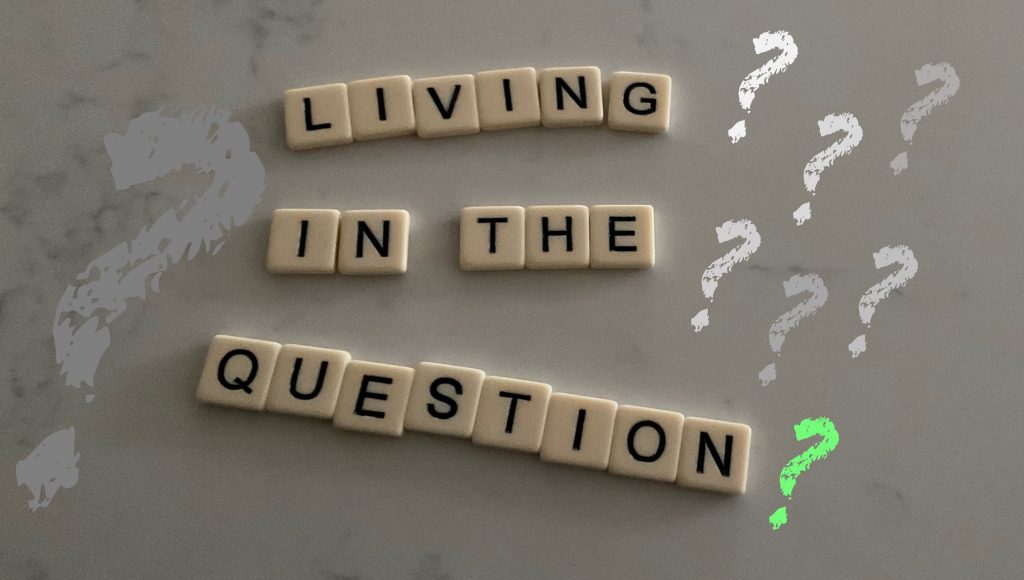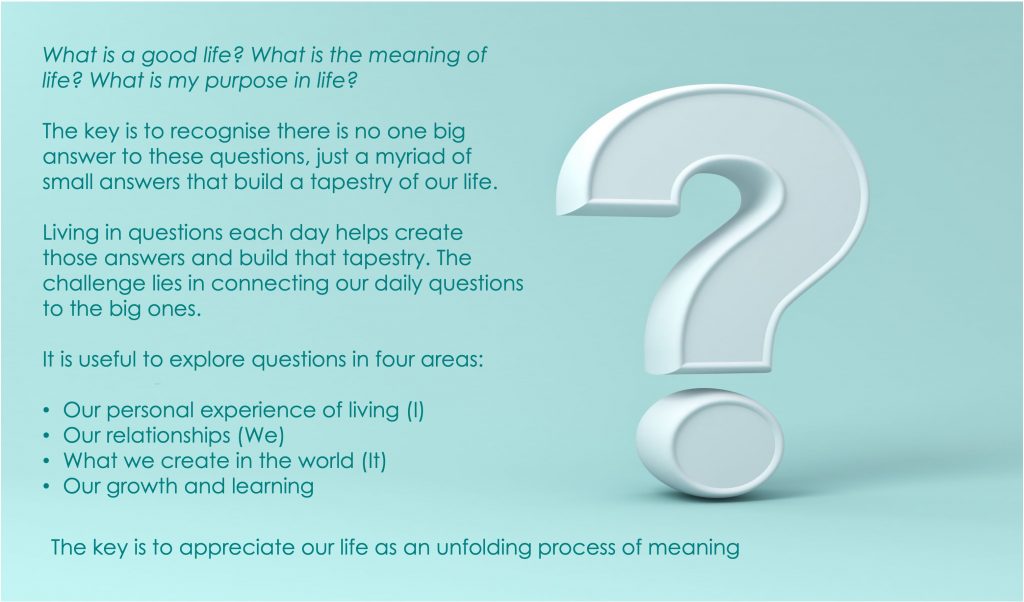
When asked about life’s meaning it is easy to start to think about the BIG questions – the meaning of existence, the nature of a good life and our individual and communal purpose. It is also easy to fall into the trap of believing there must be a big answer to those big questions. One that must be right and which speaks to some objective ideal. This search for the ‘right answers’ is unsurprising as this is what we are taught to do throughout life. At school, we progress by knowing the correct answers. The same applies at work, indeed in all aspects of life. For many people, being seen not to know is a source of shame and embarrassment and can have a major impact on their self-story. Added to this, we are largely rewarded for knowing the answers to other people’s questions and rarely asking our own. In part, this is why people seek out coaches to help them ask the questions they cannot ask themselves.
These BIG questions focus on the meaning of life rather than meaning found in life. So what is the difference? Let’s look at the big questions and the meaning of life first.
The meaning of life speaks to a big answer to a universal sense of meaning. Generally we draw that meaning from our current circumstances and the standard practices of the community in which we live. This has been the case for millennia. In the past, the reasons for our existence have been largely found in the narratives of religion, nationhood and social structures. God through his earthly representatives or a King would decree the nature of a good life or maybe the meaning of life would simply be found in one’s place in society – “I am a carpenter”. For many, modernity and a shift to secularism and democracy has changed the source of the big answers to life such we now see the possibility of ourselves as the creator of the meaning of our life. This is not to say that many people still look to a higher power for an answer; they do and often find there great comfort and a sense of certainty about their life.
For those who accept this shift in responsibility of authorship, the feeling can be both freeing and confronting. Freeing because we have the power to author our life’s meaning. Confronting because we have to do so.
Ironically, this leads many people to go in search of meaning thereby dismissing their capacity to be the author of their life and falling back into seeking a big answer from a higher authority. It is also common to hear of people going on journeys of self-discovery where they seek their true self and with it life’s meaning. The implication, which is not valid in this work, is there is a true self and meaning to be found rather than created. This simple distinction between finding and creating meaning sets us on very different paths.
So what about meaning in life? In this approach, we are seen as meaning making beings. We are always interpreting what is happening in the world and within ourselves in order to navigate life. In doing so, we are constantly creating meaning that forms the basis of our rich stories about the world and ourselves.
Generally those stories form haphazardly and are disconnected from the big questions of life. We may draw links between the daily process of making meaning and life’s overall meaning when we find ourselves in major breakdown but this is rare.
Rather than seeking big answers about life’s meaning, I favour the idea of building meaning in everyday experience with a view to building a rich and aligned story. The key to this lies in the foundations of the stories we wish to build. These foundations are found in the fundamental question of who we want to become. To do this in a balanced way, we start from Ken Wilber’s integral approach and focus on four key domains of life:
- Our personal experience of living (I)
- Our relationships (We)
- What we create in the world (It)
- Our growth and learning (Psychological Development)
By establishing a foundational value (or concept) in each of these domains, we can then use those values as the basis of ongoing questions to feed into the bigger meaning of our becoming.
For example, we might choose ‘integrity’ as our foundational value in the ‘I’ domain. In any given breakdown or situation, we can then ask “how would I do this in integrity?” We start from the premise there is no fixed definition of ‘integrity’ rather we build our interpretation of what it means to us through life’s experiences. Each time we do this we develop a richer meaning of ‘integrity’ as it applies to us. We can also use these questions to keep ourselves aligned to our bigger questions of life, in particular, who we want to become.
